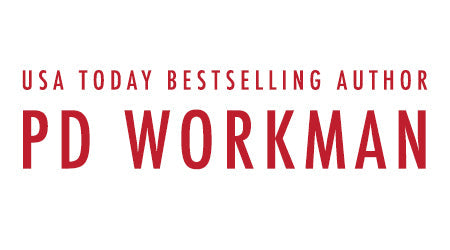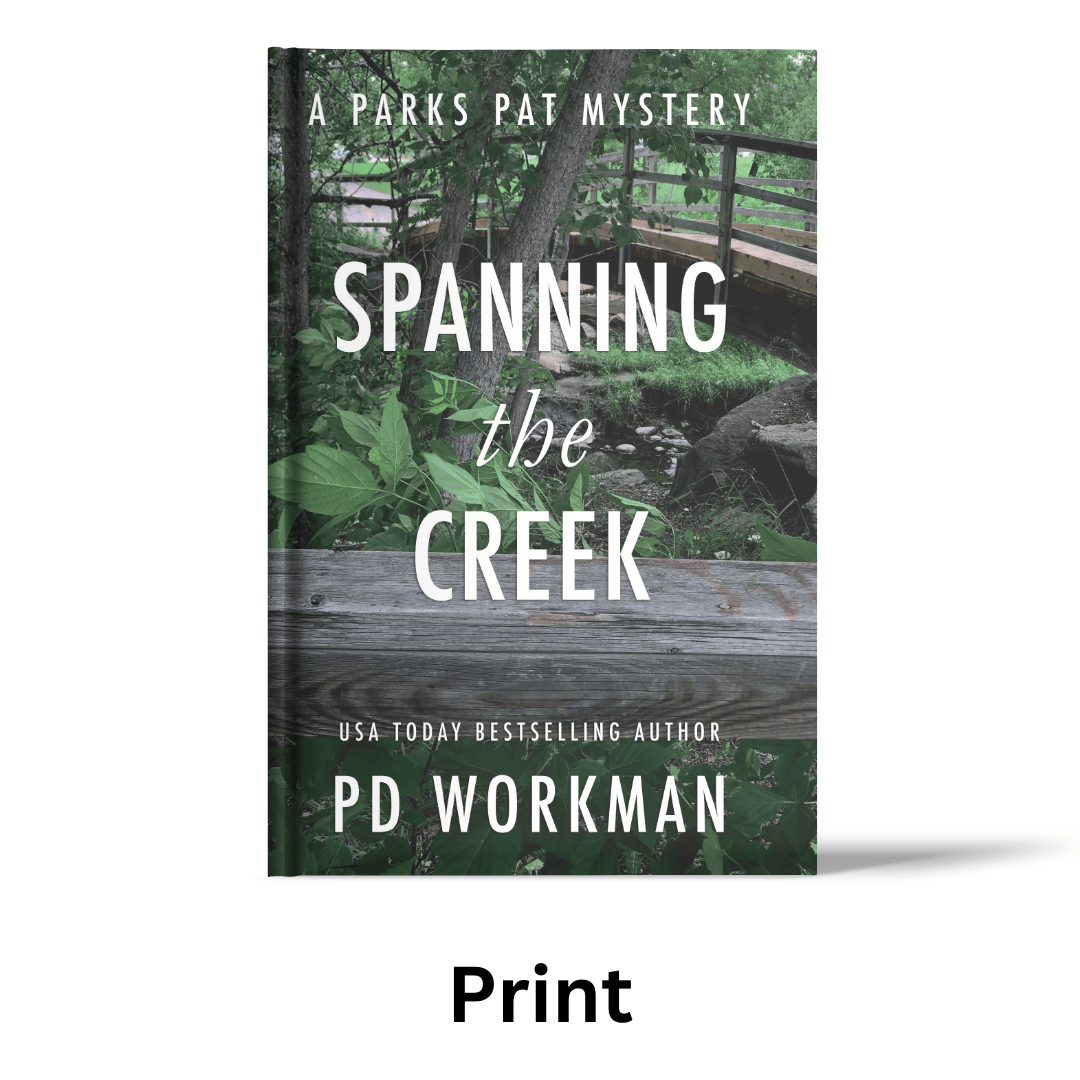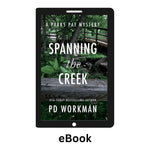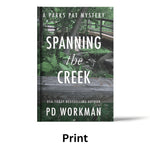Spanning the Creek - PP8 paperback
Spanning the Creek - PP8 paperback
Couldn't load pickup availability
Be careful what you wish for!
City Hall wanted the death of Samuel Keller to be anything but an accident. Confederation Park had seen too many tragedies lately and did not need another added to the tally.
But Detective “Parks Pat” Patenaude had not been expecting to find evidence of murder.
Sometimes an accident is just an accident.
But sometimes it’s not.
⭐️⭐️⭐️⭐️⭐️ P.D. Workman is an incredibly versatile writer. No matter which of her books I read I am drawn into a great story and honestly, I don’t think I’ve followed another author that could go from cozy mystery to YA to a PI series dealing with mental health issues. Really enjoy her books!
Looking for a police procedural set in picturesque Canada? Let Award-winning and Bestselling Author P.D. Workman take you to her favourite Calgary parks, as Métis detective Margie Patenaude investigates a murder in this fast-paced new series.
These short mysteries are just right for those days when you could use a break from your busy life. Take a walk in a Calgary park with Parks Pat.
Jump into in a new mystery today!
Shipping & Returns
Shipping & Returns
All sales are final.
If you have accidentally purchased the same ebook twice, please contact me and we will work it out with a refund or store credit.
Physical products which have not yet been fulfilled can be cancelled, but once they have been shipped to you, they may not be returned.
Share
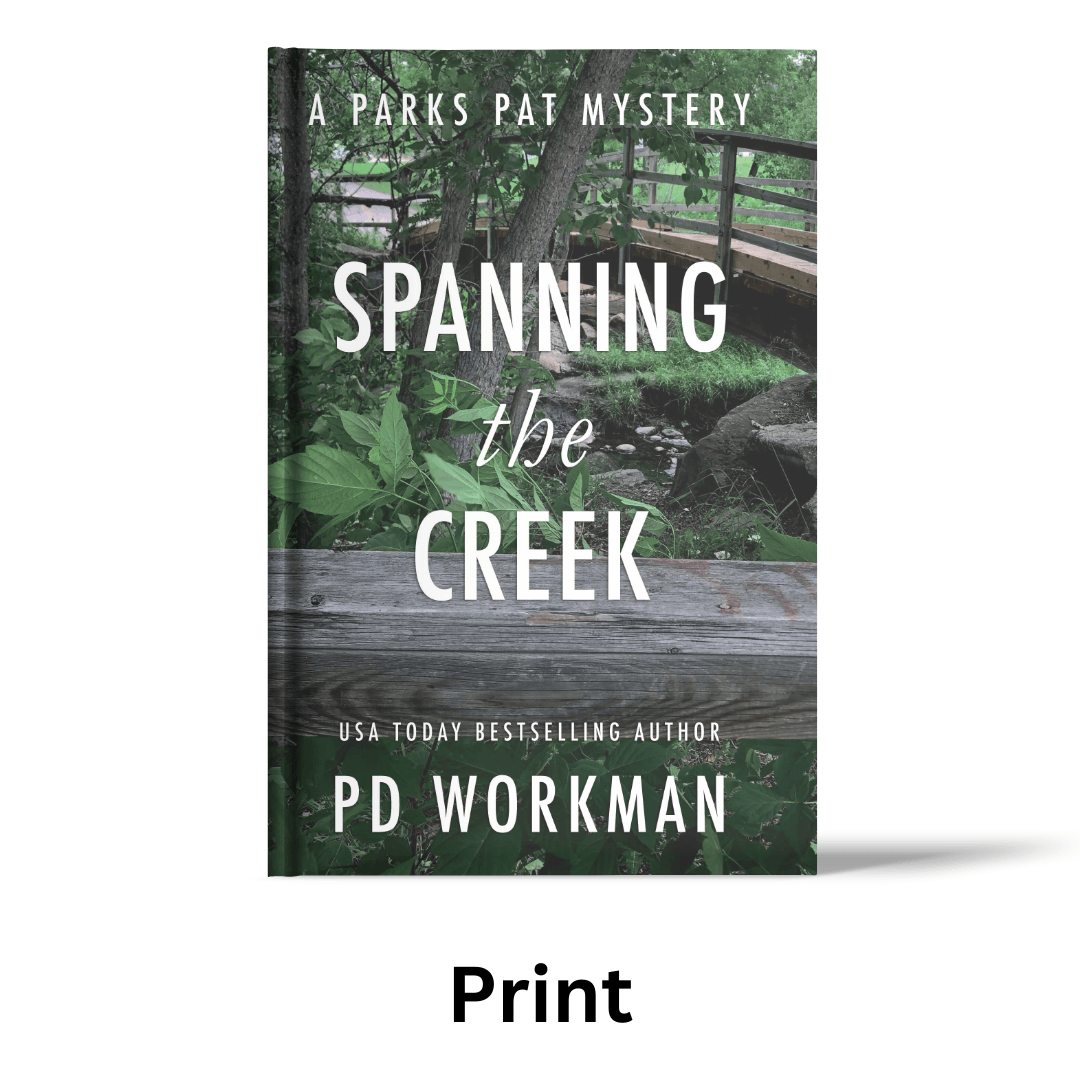
Collapsible content
Click to Read Sample
CHAPTER 1
Margie awoke to the insistent buzzing, flashing, and beeping of her phone on the side table. She rubbed her eyes and picked it up. She squinted blearily at the screen, then swiped to answer it.
“Detective Pat—Patenaude,” she greeted, her voice hoarse. She cleared her throat. “How can I help you?”
“Detective Patenaude, we have a death scene that requires your attendance.”
Margie had suspected as much when she’d seen the caller ID. “Yeah. Where is it? Where do I need to be?”
“Confederation Park. I can send you GPS coordinates to the exact location.”
“That one is…” Margie tried to remember what she knew about the park. “Northwest?”
“Yes.”
Not as far north as Nose Hill Park. Hopefully, nothing like that case. Margie wasn’t prepared to face nature at its cruelest today.
“What is the apparent cause of death?”
“Blunt force trauma. Accident.”
“You don’t need me for an accident.”
“Until the Office of the Chief Medical Examiner clears it, they want to have a homicide officer on the case. Just to be sure that all of the I’s are dotted and T’s are crossed.”
And, of course, everyone knew that if a death occurred in a park, Margie “Parks Pat” was the detective to call. Her name had become associated with fatalities in parks, and now she couldn’t separate herself from the automatic assumption that she had special expertise in park settings.
“Okay. I’m in the southeast and will take a little while to get myself presentable and drive there. They’ll need to be prepared to wait.”
“It always takes time,” the dispatcher told her. “I’ll let them know you’re on the way.”
Margie sat up and put her feet over the side of the bed, knowing that she had to do something to wake herself up enough that she wouldn’t just close her eyes and go back to sleep. She rubbed her eyes, then forced herself to get up and make the trip to the bathroom, where she splashed water on her face, ran a brush through her hair, and started to braid her long, black hair preparatory to pinning it into a bun. It wasn’t that early. Some runners, cyclists, and dog walkers were already doing their morning constitutionals. One of them had probably stumbled across the body in Confederation Park. A dog walker would be her guess. Dogs were curious creatures and dead bodies definitely attracted their attention.
“Mom? Are you up?”
Margie stuck her head out the bathroom door to talk to Christina, still in bed in her own room, her voice drowsy but concerned. “You can go back to sleep, hon. It’s not time to get up yet. I just got a call out. So you’ll have to get yourself up and to school in the morning.”
“Yeah. I can do that.”
“Good girl. Do you have an alarm set?”
“Uh-huh.”
“Go back to sleep, then. Call me when you’re up to check in.”
“Wii,” Christina agreed. Margie could hear her breathing lengthen and deepen and knew that the girl was back asleep.
The park location was already entered into Margie’s GPS, but she took a detour, risking the wrath of the computerized voice, which kept advising her to perform a U-turn, in order to stop in at the Tim Hortons, where she got a fresh cup of coffee for herself and several others. It might not be enough for everyone on the scene, but at least a few of the officers in attendance would appreciate her.
Once she had secured the cups of coffee in the car, she followed the directions of the GPS to take her across the city to the northwest. It was still dark when she arrived at Confederation Park. Seeing the red and blue flashing lights, she chose the west parking lot and turned left across the traffic once it was safe. There were a few cars parked in the lot already, despite the earliness of the hour. Those dedicated runners and dog walkers who did not live close enough to the park to get in on foot. And a couple of police cars that were there ahead of her to secure the scene.
Margie pulled on her mask and grabbed the tray of coffee. One officer had been left in the parking lot, and he nodded to her as she walked toward the pathway entering the park.
“Ma’am?”
She apparently looked official enough, even without a uniform, that he guessed who she was.
“Detective Patenaude.” Margie held out the tray. “Tim’s?”
“Don’t mind if I do,” he said agreeably, and carefully took one out of the tray, making sure that Margie still held it balanced as he removed the weight. “Take this pathway. Your first right and across a bridge. Then stay on the main trail following the creek. It’s at the second bridge. You can’t miss it.”
“Great, thanks. How far?”
He shrugged. “Kilometer, maybe. Not far.”
Margie nodded and started along the pathway, which led downhill initially. The park was like a bowl, in a valley or coulee between the surrounding hills. Houses on top of the hill looked down on the park. She could see lights on in some of their windows, bright jewels in the predawn dimness.
It was very quiet walking to the scene of the death. The officer in the parking lot was probably turning runners and dog-walkers away, letting them know that they would have to find somewhere else to get their early morning constitutionals. Keeping the scene as clean as they could until it had been processed.
The route was not quite as clear in the darkness of the morning as Margie would have hoped, and it wasn’t as easy to follow the officer’s directions as he might have thought. The black shapes of large, mature trees kept her from seeing anything past the turns of the trail. There was a dampness in the air; the cool breeze carried the odor of moist grass and leaf decay. She wouldn’t be able to see any of the ground cover until the sun came up. But Margie had the GPS coordinates on her phone and followed the pathways the best she could to get to the accident scene, where there were a number of lights set up already, along with orange pylons and yellow tape.
An officer stationed outside the yellow tape held up his hand to stop Margie and greet her. “Detective?” he guessed.
Margie nodded. “Detective Margie Patenaude. Homicide.”
“They really did get us Parks Pat.” He looked amused by this. “Well, I’m afraid there isn’t too much opportunity to put your expertise to use here. And from the looks of things, it’s not a homicide.”
“That’s what I was told,” Margie acknowledged. “I’ll take a quick look and let the Office of the Chief Medical Examiner take care of things from there.”
He nodded. Margie supplied him with a cup of coffee, which he took gratefully.
Margie suited up to prevent contamination of the scene and crossed the tape. It was clear where the body was from the positioning of the lights and the other law enforcement officers on the scene. Margie carefully picked her way down the trail, sticking to the paved pathway to avoid adding footprints to the soft ground.
“What have we got, gentlemen?” She handed the tray of the remaining coffee cups to one of the officers to free up her hands. He passed them out.
“Have a look. Electric scooter. Looks like he missed the bridge or was going too fast, took a header into the creek.”
CHAPTER 2
The best vantage point appeared to be from the wooden footbridge. Margie did not like being over the water. She stood in the middle of it and looked down at the creek a few feet below, her heart beating fast. She shivered and rubbed her arms. There was no danger of drowning, since the creek was shallow, only knee deep in the middle. Not somewhere she would be in danger of drowning if, for some reason, she ended up in the water, which wasn’t going to happen. Plenty of large rocks. Not a soft landing, as the man who lay sprawled partially in the creek and partially on the bank had discovered.
Hopefully, he hadn’t been aware for long after going off the trail. The landing on the rocks had been enough to render him unconscious if it had not immediately killed him. There were no signs that he had tried to get back up, no blood smears or scratches from grasping fingers as he’d tried to find purchase to pull himself back up again.
The man was in his forties, by Margie’s guess. Dressed casually. Balding. No beard.
“How well-lit is it at night? Before you put up your lights?”
“It’s not. Generally, the folks who use the park before first light use headlamps or flashlights. They use it regularly, so they know it pretty well. I don’t know whether this guy was a regular or not. I’d assume not, since he missed the turn onto the bridge.”
Margie nodded. She looked at the scooter lying a few feet away from the man. It looked as if it had gone in one direction and the man had gone in the other.
“It looks pretty clear,” she agreed in a forced and even tone. She put one foot in front of the other. If she could make it off the bridge without looking down, the cops would not sense the panic she felt at being over a body of water she didn’t know. “I don’t want to get too close to the body and contaminate anything. Especially with that soft mud. Crime scene techs are on their way?”
“They say they’re on their way,” the officer she had given the coffee tray to sighed. “Hopefully, they’re not just bluffing and will be here within the next hour.”
“And somebody has checked for a pulse? I don’t need to climb down there?”
“Rand and Parker both checked.” He motioned to two of his colleagues. “So no, we probably don’t need your footprints down there too.”
“Good.” Margie nodded. Now it was a waiting game. Even though it wasn’t a homicide, she would be stuck on the scene until the crime techs were done and the Office of the Chief Medical Examiner had removed the body and released the scene. Provided there weren’t any surprises—like finding a knife or gunshot wound on their accident victim—Margie would then be free to head into the office to start filling out all of the necessary paperwork.
---
Margie arrived in the bullpen and could feel everyone’s eyes on her. She looked around and raised her brows at Katelyn Jones, the blond detective who sat closest to her.
“What?”
“Sergeant wants you.”
“I just walked in the door.”
Jones shrugged. “I don’t know what’s up, but he’s been on the phone trying to smooth things over for ages. What happened at that scene in Confederation Park?”
“Nothing.” Margie shook her head. “Literally, nothing. I couldn’t see any indication that it was anything other than an accident. I hung around until everyone was finished gathering evidence… of which there was none… and the Office of the Chief Medical Examiner came to pick up the body. Once he was gone… Well, here I am.”
She had, of course, stopped for something to eat between leaving the park and arriving at the Homicide Division offices, but she didn’t need to include that in her narrative. A ten-minute break after being stuck at a non-homicide crime scene for several hours wasn’t even worth mentioning. The breakfast wrap she had wolfed down was now sitting in her stomach like a lead weight. Or maybe that was partially anxiety over what Staff Sergeant MacDonald wanted. Her investigation had been by the book, and there hadn’t been anything controversial about it.
Maybe it was nothing to do with the death in Confederation Park. Perhaps it was about an older file or a newer one that had just landed on his desk. Margie was jumping to conclusions by assuming she was in trouble. Just because MacDonald had been on his phone all morning, that didn’t mean it was anything to do with Margie. Or the case. It might not even be anything police related. It could be personal or family problems—nothing to do with why he wanted to see Margie.
Or maybe his daughter was selling Scout Popcorn and he was looking for an easy mark.
It could happen.
Margie slowly put her purse into her drawer and divested herself of her outdoor clothing. “You think it’s bad? You think it’s about this case?”
“I don’t know. I just assumed that it was.”
Was about the case?
Or was bad?
Or both?
“Sheesh.” Margie looked around for her coffee cup, then realized that she had only been there for a minute and hadn’t been to the kitchen to get herself a coffee yet.
Jones made a shooing motion. “You go see him. I’ll bring you a coffee.”
“Really? You’re awesome.”
“Go on. He wanted you as soon as you got in the door.”
Margie nodded and headed over to MacDonald’s office. His door was closed, but he apparently saw her through the glass pane beside the door because, as she reached out to knock, he called her in. He was an older man with something of a military bearing and short, silver-gray hair.
“Detective Patenaude. Thanks for coming by.”
“Detective Jones said it was urgent. Sorry, I just got here. Was held up since early this morning at that accident scene.”
He grimaced and scratched the back of his neck, brows drawn down in a scowl. “You’re sure that this man—what was his name?”
“His wallet said Samuel Keller.”
“This Samuel Keller. You’re sure it was an accident.”
“Yes, sir,” Margie assured him firmly. “There was no sign of any other party. No sign of violence. He didn’t fight back. He was apparently going too fast on his e-scooter, cut the curve too tight, and ended up going over the embankment instead of the bridge. Just… driver error? Whatever you call it when someone is riding one of those things.”
“I hate those motorized contraptions. They’ve been nothing but trouble since they got popular. People running into each other, off pathways, into the traffic… whoever thought of motorizing those things…”
Margie nodded sympathetically. As far as she knew, this was the only fatality, though hundreds of people had been through the emergency room due to the proliferation of e-scooters.
MacDonald flipped through papers on his desk with a heavy hand, clearly upset about something. Margie waited for more information.
“I’ve been fielding calls from City Hall.”
“About what?”
“They don’t want your accident to be an accident.”
Margie blinked. “What? I thought they would be happy that it was an accident. Keep the murder rate down. No need to investigate any further, waste taxpayer dollars. Usually, it’s the opposite. They want the ME to find that it was something other than murder. Anything else.”
“That’s not the case this time. You didn’t see the memorial there?”
Margie shook her head. It had been dark when she had initially walked into the death scene. But it had been full light when she had walked out, and she couldn’t remember seeing anything that might be of concern. There was a sculpture at the parking lot she had left her car in. Across the street, there was a circle of provincial flags honoring Canadian confederation—unsurprisingly not incorporating any Indigenous flags—along with a flower bed in the shape of a maple leaf. But a memorial?
Jones knocked on the doorframe and looked in. She held up the coffee mug destined for Margie. “Sorry to interrupt.”
“Thanks.” Margie took it from her. “I really need that.”
Never mind the two coffees she had already consumed. It was still morning and, after being awakened so early, she needed something to help her to stay alert.
Jones nodded and withdrew again. Margie sipped the scalding hot coffee and looked at MacDonald, waiting for his explanation.
“There was a death last year,” MacDonald said heavily. “A young boy who biked into a bridge. And then this year, just in June, a skateboarder who was critically injured in the same place. The Ward Four Alderman is having kittens over it. They made some changes to the bridge, put up warning signs, and did everything they could to smooth things over with the public and assure them that it is now safe—and then this. They are going to be out for blood. How do you think the mothers of those two kids will feel hearing that there has been another accident?”
“Out for blood,” Margie echoed in agreement.
“Exactly. So this needs to not be an accident. Or to somehow be an accident under extenuating circumstances. Because the guy had a heart attack. Or was drunk. Not because the park is inherently dangerous.”
“Right. Well, it will be up to the medical examiner to make that determination. Nothing I can do to influence it one way or the other.”
“It didn’t look dangerous to you?”
“No.” Margie shook her head. She reviewed the scene in her mind. Maybe the driver had been drunk or had suffered a heart attack; it didn’t look like a particularly dangerous location. “I think… Keller was driving in the dark, too fast, and he just misjudged where the edge of the bridge was.”
“Isn’t there a rail? To keep people from going off?”
“On the bridge itself, yes. You can’t just walk or fall off the side; you’d have to climb. But the bridge and rails are here,” she made a motion lowering her two parallel hands in front of her to show the position of the bridge. “And the scooter went off here.” She turned her body and pointed, showing MacDonald how he had missed the bridge altogether to go over the bank and into the water.
Into the rocks.
It wasn’t the water that had killed him. Margie didn’t need to be afraid of the little stream of water that flowed through the park. It was nothing.
“Why was he going too fast?” MacDonald demanded. “Why was he driving in the dark? Isn’t there enough lighting over there?”
“I don’t know why he was going so fast. And the lighting… No, it’s not well-lit. It’s closed at night.”
“And you didn’t see the memorial?”
“No. Are you sure there is one?”
“That’s what I’m being told. Okay. I want you to call the alderman’s office. Talk to his executive assistant. Be of whatever help you can to her, indicating that it is not the problem of a badly engineered park. It was Keller’s fault.”
“You don’t think we’ll get in trouble for victim blaming?”
“We’ll deal with that when it comes. I think in this case, there will be less outcry over blaming the victim than there will be in having a death park.”
“A death park?”
He just looked at her.
Margie swallowed. “No death park,” she agreed.
MacDonald wrote out a phone number and name and handed it to her. “Call her. Get it straightened out. We need to be proactive about this. Get ahead of the papers with our story.”
“I’ll do what I can,” Margie agreed, taking the paper from him.
“Take care of this for me,” MacDonald told her.
Award-winning Canadian author P.D. Workman has written over a hundred addictive page-turners featuring diverse and divergent sleuths, high-stakes investigations, and stories that linger long after the last page.
Her books dive deep into characters’ minds while exploring timely social issues through fast-paced, emotionally charged plots. Readers praise her work for its powerful emotional truth combined with unputdownable suspense.
